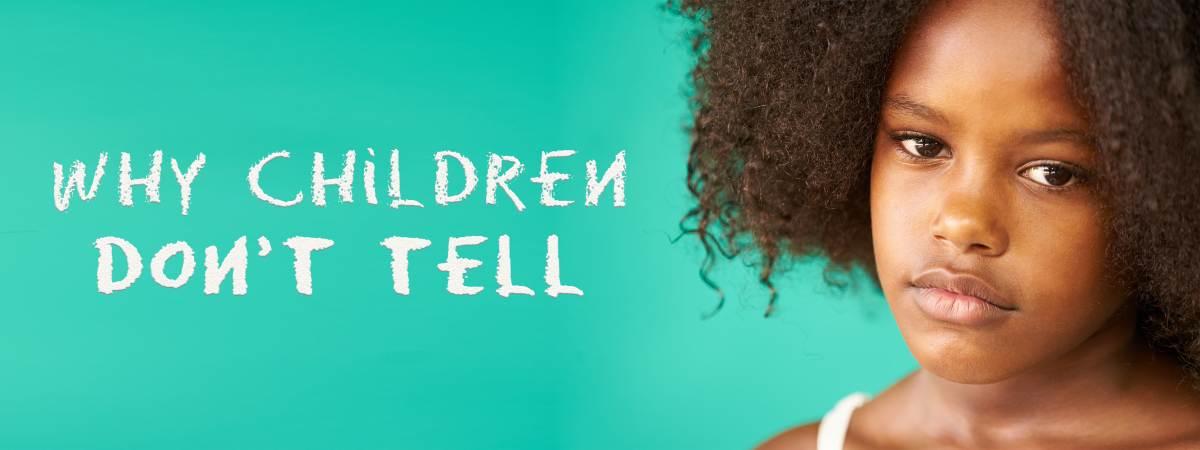
As a Forensic Interviewer, I testify in civil and criminal court on a regular basis about child sexual abuse dynamics. I have seen that people find it difficult to believe victims' statements of sexual abuse because so often they have waited months, sometimes years, to report their experiences of abuse. As a professional in the field, this can be frustrating, as delayed disclosures are very common. Why do victims of sexual abuse delay reporting when they are living through their own personal nightmares?
In the last year in Tarrant County, over half of the children interviewed at Alliance For Children delayed reporting abuse.1 Other research supports similar or higher numbers of victims delaying disclosure or waiting to disclose until adulthood. We also see these trends reflected in some of the high profile cases that are currently in the media. There are many different sexual abuse dynamics that affect why a victim may wait to tell, or never disclose at all.
The relationship the child has to the perpetrator may create barriers to disclosure. Over 90% of the time, victims of sexual abuse are abused by someone they know and trust. This is a very confusing dynamic for children; the people who tend to abuse them are people that should be caring for them; people they are taught to respect; people who should not hurt them. Because of this, telling can be very complicated. Younger children may be confused, possibly believing that what the perpetrator is doing is normal. Oftentimes victims still care for the person who is abusing them, and may be concerned that telling will lead to the perpetrator getting in trouble.
Fear of consequences not only for the perpetrator, but for the victims themselves and their families, can also make immediate disclosure difficult. Perpetrators may make threats to victims about hurting them or people they care about. Because of the stigmas associated with sex, victims also may believe they are at fault, that no one will believe them if they tell, or that they are impure and dirty. These ideas lead to victims feeling shameful and embarrassed about what happened, and may fear repercussions from parents or family members if they tell.
Some victims of sexual abuse live in homes where they feel a lack of support due to dysfunctional family dynamics, separated parents, single parent homes, or may just feel like their caretakers have too much going on, and do not have time to listen. Children at times also feel responsible for the well-being of their families, and are afraid of ruining relationships between the perpetrator and other family members. At other times, the perpetrator is a main source of income for the family and children may fear that reporting will lead to their family becoming homeless or unable to put food on the table.
We also see children who are not taught that safe adults exist outside of their family unit, so they do not recognize that teachers, counselors, police officers, etc. could be resources to them if they are suffering abuse at home. At the same time, these children may have a negative interpretation of professional involvement, like that of Child Protective Services (CPS) or law enforcement. Children with a history of CPS involvement may fear being removed from their homes if they report abuse. This misunderstanding could lead to denials when reports are initially generated, which further delays the child's disclosure.
So what can we do? Educate. Listen. Be patient. We need to train adults how to respond appropriately to sexual abuse disclosures, and to understand some of the dynamics and barriers these victims may be coping with. We need to remind children that we care; check in, be available and notice if children start acting differently. Lastly, remember that disclosure is a process, not a one-time event.
1 Based on 1,181 forensic interviews conducted at Alliance For Children center October 2016-September 2017 when an outcry was made.
Resources
Bruck, M., et. al. (2005). Disclosure of child sexual abuse: What does the research tell us about the ways that children tell? Psychology, Public Policy, and Law, 11(1), 194-226.
Collin-Vezina, D., et. al. A preliminary mapping of individual, relational, and social factors that impede disclosure of childhood sexual abuse. Child Abuse and Neglect (2015),
http://dx.doi.org/10.1016/j.chiabu.2015.03.010
Sorensen, T., & Snow, B. (1991). How children tell: The process of disclosure in child sexual abuse. Child Welfare, 70(1), 3-15.
Summit, R. C. (1983). The child sexual abuse accommodation syndrome. Child Abuse and Neglect, 7, 177-193.
About the Author
Samantha has vast experience in talking to children about the topic of abuse. She started her career with Alliance For Children by educating children in Tarrant County about personal body safety, through a program called P.S. It's My Body and internet safety, through a program called Netsmartz. Samantha is currently employed as Alliance For Children's Lead Forensic Interviewer and assists Tarrant County law enforcement and the Texas Department of Family and Protective Services by conducting specialized investigative interviews of children. The goal of a forensic interview is to gather information from children in a neutral, non-leading, and legally defensible manner.



